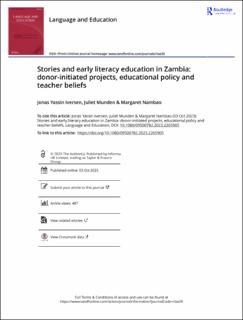| dc.contributor.author | Iversen, Jonas | |
| dc.contributor.author | Munden, Juliet Hilary | |
| dc.contributor.author | Nambao, Margaret | |
| dc.date.accessioned | 2024-02-21T09:17:51Z | |
| dc.date.available | 2024-02-21T09:17:51Z | |
| dc.date.created | 2023-09-25T13:37:29Z | |
| dc.date.issued | 2023 | |
| dc.identifier.citation | Language and Education. 2023, 1-18. | en_US |
| dc.identifier.issn | 0950-0782 | |
| dc.identifier.uri | https://hdl.handle.net/11250/3118903 | |
| dc.description | This is an open access article distributed under the terms of the creative commons attribution-noncommercial-noderivatives License (http://creativecommons.org/licenses/by-nc-nd/4.0/). | en_US |
| dc.description.abstract | Limited access to reading material written in local languages is considered a contributing factor to poor reading achievement in Sub-Saharan Africa. Several non-government projects are attempting to compensate for this by providing extensive reading material. One such project is the non-commercial, donor-initiated African Storybook. This article examines the premise on which African Storybook and similar donor-initiated projects build, namely that providing stories in local languages can significantly improve early literacy achievement. Understanding literacy as social practice, we investigate what experiences with stories inform the literacy-related beliefs of pre-service teachers in Zambia, and how these beliefs may shed light on their response to storybooks as part of early literacy education. Our data comprises a questionnaire with 26 pre-service teachers and focus group interviews with six of them. The pre-service teachers’ beliefs were found to reflect their childhood experiences with stories and the Zambian official National Literacy Framework. Our findings indicate that neither their childhood experiences nor their teacher education had prepared the pre-service teachers to use stories for extensive reading in early literacy education. These findings lead us to question whether literacy delivery is best served by initiatives that are not coordinated with both national literacy policy, curriculum and local teacher beliefs. | en_US |
| dc.language.iso | eng | en_US |
| dc.rights | Attribution-NonCommercial-NoDerivatives 4.0 Internasjonal | * |
| dc.rights.uri | http://creativecommons.org/licenses/by-nc-nd/4.0/deed.no | * |
| dc.title | Stories and early literacy education in Zambia: donor-initiated projects, educational policy and teacher beliefs | en_US |
| dc.title.alternative | Stories and early literacy education in Zambia: donor-initiated projects, educational policy and teacher beliefs | en_US |
| dc.type | Peer reviewed | en_US |
| dc.type | Journal article | en_US |
| dc.description.version | publishedVersion | en_US |
| dc.rights.holder | © 2023 the author(s). | en_US |
| dc.source.pagenumber | 1-18 | en_US |
| dc.source.journal | Language and Education | en_US |
| dc.identifier.doi | 10.1080/09500782.2023.2265905 | |
| dc.identifier.cristin | 2178599 | |
| cristin.ispublished | true | |
| cristin.fulltext | original | |
| cristin.qualitycode | 1 | |

